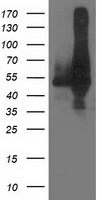 首页>
生物试剂
首页>
生物试剂
商家描述
产品评价(0)
商品介绍
gene_symbol:Prostate Specific Antigen
Synonyms:APS; hK3; KLK2A1; PSA
clone_name:OTI1F7
immunogen:Human recombinant protein fragment corresponding to amino acids 25-261 of human KLK3(NP_001639) produced in E.coli.
predicted_size:26.8 kDa
background:Kallikreins are a subgroup of serine proteases having diverse physiological functions. Growing evidence suggests that many kallikreins are implicated in carcinogenesis and some have potential as novel cancer and other disease biomarkers. This gene is one of the fifteen kallikrein subfamily members located in a cluster on chromosome 19. Its protein product is a protease present in seminal plasma. It is thought to function normally in the liquefaction of seminal coagulum, presumably by hydrolysis of the high molecular mass seminal vesicle protein. Serum level of this protein, called PSA in the clinical setting, is useful in the diagnosis and monitoring of prostatic carcinoma. Alternate splicing of this gene generates several transcript variants encoding different isoforms. [provided by RefSeq, Jul 2008]
buffer:PBS (pH 7.3) containing 1% BSA, 50% glycerol and 0.02% sodium azide.
purification:Purified from mouse ascites fluids or tissue culture supernatant by affinity chromatography (protein A/G)
isotype:IgG1
host:Mouse
applications:IHC, WB
Recommend Dilution:WB 1:2000, IHC 1:150
reactivities:Human
storage:Store at -20°C as received.
gene_symbol:Prostate Specific Antigen
Synonyms:APS; hK3; KLK2A1; PSA
clone_name:OTI1F7
immunogen:Human recombinant protein fragment corresponding to amino acids 25-261 of human KLK3(NP_001639) produced in E.coli.
predicted_size:26.8 kDa
background:Kallikreins are a subgroup of serine proteases having diverse physiological functions. Growing evidence suggests that many kallikreins are implicated in carcinogenesis and some have potential as novel cancer and other disease biomarkers. This gene is one of the fifteen kallikrein subfamily members located in a cluster on chromosome 19. Its protein product is a protease present in seminal plasma. It is thought to function normally in the liquefaction of seminal coagulum, presumably by hydrolysis of the high molecular mass seminal vesicle protein. Serum level of this protein, called PSA in the clinical setting, is useful in the diagnosis and monitoring of prostatic carcinoma. Alternate splicing of this gene generates several transcript variants encoding different isoforms. [provided by RefSeq, Jul 2008]
buffer:PBS (pH 7.3) containing 1% BSA, 50% glycerol and 0.02% sodium azide.
purification:Purified from mouse ascites fluids or tissue culture supernatant by affinity chromatography (protein A/G)
isotype:IgG1
host:Mouse
applications:IHC, WB
Recommend Dilution:WB 1:2000, IHC 1:150
reactivities:Human
storage:Store at -20°C as received.
 会员登录
会员登录.getTime()%>)
 购物车()
购物车()

 成功收藏产品
成功收藏产品